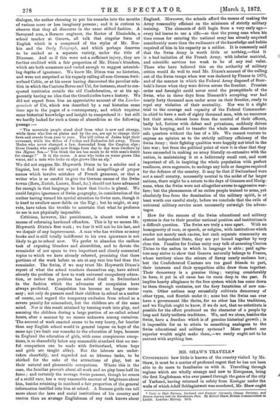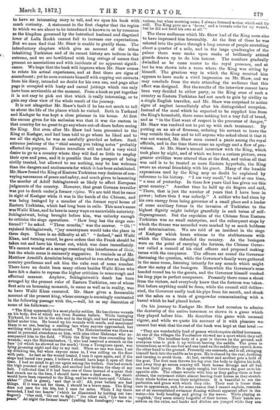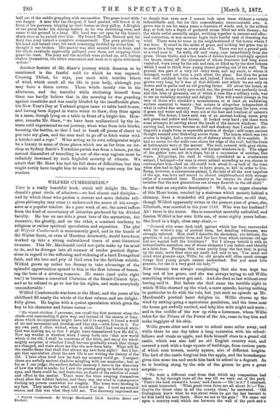MR. SHAW'S TRAVELS.*
CoNsinEniNG how little is known of the country visited by Mr. Shaw, it must be a matter of profound regret that he has not been able to do more to familiarize us with it. Travelling through regions which are wholly strange and new to Europeans, being the first Englishman who ever passed through the gates of the city of Yarkand, having returned in safety from Bashgar under the walls of which Adolf Schlagintweit was murdered, Mr. Shaw ought * Visits to High Tariary, Yarkand, and Kashgar (Jbrmerly Chinese 7tirtary), and Return Journey over the Karakoram Pass. By Robert Shaw, British Commissioner in Ladalc. London: Murray. 1871
to have an interesting story to tell, and we open his book with much curiosity. A statement in the first chapter that the region to which we are about to be introduced is known to us by romance as the kingdom governed by the betrothed husband and disguised lover of Leila Rookh cannot fail to increase our expectations. Bat we soon find that Mr. Shaw is unable to gratify them. The introductory chapters which give an account of the tribes inhabiting Turkistan and of its recent history are tedious in the extreme, and we are bewildered with long strings of names that present no associations and with incidents of no apparent signifi- cance. We hope that the book will improve when Mr. Shaw comes to relate his actual experiences, and at first there are signs of amendment ; yet he soon contents himself with copying out extracts from his diary, intended no doubt for his own use, and page after page is occupied with hasty and casual jottings which can only have been serviceable at the moment. From a book so put together it is not easy to pick out that which is really interesting, or to gain any clear view of the whole result of the journey.
It is not altogether Mr. Shaw's fault if he has not much to tell us about the life of the places which he visited. Both in Yarkand and Kashgar he was kept a close prisoner in his house. At first the excuse given for his seclusion was that it was the custom in that country for no guest to go anywhere out-of-doors before seeing the King. But even after Mr. Shaw had been presented to the King at Kashgar, and had been told to go where he liked and to see all the sights, he was as carefully guarded as before. Such extreme jealousy of the " chiel amang you taking notes" probably effected its purpose. Future travellers will not feel a very vivid desire to go to a country where they will find so little to employ their eyes and pens, and it is possible that the prospect of being civilly treated, but allowed to see nothing, may be less welcome than the dangers and excitements for which it has been substituted. Mr. Shaw found the King of Eastern Turkistan very desirous of con- veying assurances of peace and safety, and much given to lamenting the murder of Adolf Schlagintweit as likely to affect European judgments of the country. However, that great German traveller was put to death under) former rigime. We are told that he came in sight of Kashgar while it was in the hands of the Chinese, and was being besieged by a member of the former royal house of Eastern Turkistan, which had long been in exile. This man's name was Walle Khan, and he bore in many ways an unenviable notoriety. Schlagintweit, being brought before him, was unlucky enough to criticize the siege operations. "How long has the siege con- tinued ? " he asked. "Three months," was the answer. " Oh ! " rejoined Schlagintweit, ";my countrymen would take the place in three days. There is no difficulty at all." "indeed," said Wane Khan, and turning round, he gave orders that the Frank should be taken out and have his throat cut, which was done immediately. We cannot wonder at a savage resenting this interference of Geist, but the whole scene is eminently suggestive. It reminds us of Mr. Matthew Arnold's Arminius being exhorted to run after an English country gentleman and ask him the cube root of some number. There have no doubt been many others besides Walle Khan who have felt a desire to repress the higher criticism in some rough and effectual manner. Anyhow, Schlagintweit's death has been avenged by the present ruler of Eastern Turkistan, one of whose first acts on becoming monarch, in name as well as in reality, was to have Wane Khan executed. Mr. Shaw gives a favourable account of the present king, whose courage is amusingly contrasted in the following passage with the,—well, let us say discretion of some of his followers :— "The King apparently is a most plucky soldier. He has eleven wounds on his body, five of which are from Russian bullets. While besieging Yarkand, he was hit in the side and in the thigh, and had several horses killed under him. Re bound up his wounds with scarfs, and mentioned them to no one, bearing a smiling face when anyone approached, but writhing with pain when unobserved. The Mahrambashee was there as usual in personal attendance on him, with nine other Mahrams who ac- companied him to the field. While the King was thus concealing his wounds,' says the Mahrambaahee, 'I, who had received a scratch on the face' (of which he showed us the mark) 'from a Toonganee spear, was lying groaning night and day in my tent. When no one was near, I sat up drinking tea, but when anyone came in, I was rolling on the floor with pain. As fast as the wound healed, I tore it open again, and if the siege had lasted two years, I believe I should have kept it open all that time. I had no mind to go out again among the bullets. One had struck the high pommel of my saddle, and another had broken the clasp of my belt. I reflected that if it had been one of these instead of a spear that had struck me in the face, I should have been a dead man. My death would have been reported to the King, and he would have said, " Allaho- lather " (God is great), 'and that is all ! Ah, your ballets are bad things. If it were not for them, I should be a brave man. The King does not care for his life, but I care for mine. While I lay there wetmded, I had two hearts' (which he illustrated by holding out two Augers). 'One said, "Go out to fight ; " the other said, "Lie here in peace.' At night the former heart' (pulling his forefinger) was vio- toriou.s, but when morning came, I always listened to that which Bald lie. still. The King gave me a ' koors,' and a brocade robe for my wound, but he did not heed his own at all.'"
On his journey to Kashgar Mr. Shaw had occasion to admire. the dexterity of the native horsemen as shown in a game which, they played before him. He describes this game with unusual, vigour, and while we quote his account of it with pleasure we cannot but wish that the rest of the book was kept at that level :—
"They are wonderfully fond of games which require skilled horsemen. Atone of the villages the Yoozbashee showed me a sport which they calk 'ooghlak.' The headless body of a goat is thrown on the ground, andr everyone tries to pick it up without leaving the saddle. The press is- tremendous, as with one foot and one band on the saddle they stretch dowm the other hand to the ground. Presently one succeed; and is off, swinging. himself back into the saddle as he goes. He is chased by the rest, doubling. and turning to avoid them. At last, another and another gets a hold ot the goat. The first man throws his leg over the body to tighten his hold,. and away they go across country till their horses diverge and all but one lose their grasp. He is again caught, but throws the goat on to his- opposite side. The others wrestle with him as they gallop three or four abreast, the outermost riders almost leaving their horses as they stretcht. their whole bodies across their neighbours. It is beautiful to see the perfection and grace with which they ride. Their seat is looser thaw ours in appearance, and, for some reason that I cannot explain, reminds. me of an accomplished swimmer floating without apparent effort in the. water—his body bending and giving to the waves. While playing at. ooghlak,' they seem utterly forgetful of their horses. Their hands are. seldom on the reins, and banks and ditches are jumped while they aro half out of the saddle grappling with one another. The game is not with- out danger. A man who has the goat, if hard pushed, will throw it in front of his pursuers, tripping up their horses as they gallop. A Kirghiz of our party broke his stirrup-leather as he was stretching over, and came to the ground in a heap. His head was cut open by the horse's sharp shoe as he passed over him. My friend Moollah Shereef and his fiery dun pony turned a complete summersault. The pony pitched on his head and turned over, his neck remaining doubled up under him. I thought it was broken. His master was shot several feet in front, and the whole cavalcade apparently galloped over them, not stopping their game the least. The pony and the moollah were picked up, and, having shaken themselves, the latter remounted and went at it again with fresh ardour."
Another feature of Mr. Shaw's journey which deserves to be mentioned is the fearful cold to which he was exposed. Crossing Thibet, he says, you meet with terrible blasts of wind, which numb all the life in your body, although you may have a dozen covers. These winds mostly rise in the afternoon, and the traveller while sheltering himself from them can hardly believe that in the morning he was guarding against sunstroke and was nearly blinded by the insufferable glare. On New Year's Day at Yarkand grapes came to table hard frozen, and having been dipped in warm water to thaw, they froze again in a mass, though lying on a table in front of a bright fire. How- ever, remarks Mr. Shaw, "we have been acclimatized by the in- tense cold experienced on our journey, when wine froze into blocks, bursting the bottles, so that I had to break off pieces of claret to put into my glass, and the men used to go off to fetch water with a hatchet and a rope." Wine acting as its own refrigerator might be a luxury in some of those places which are as far from an ice- shop as Sydney Smith's Yorkshire parish was from a lemon, yet the normal discomfort of travelling in out-of-the-way regions must be infinitely increased by such frightful severity of climate. We admit that Mr. Shaw has had his full share of difficulties, but this might surely have taught him to make the way more easy for his readers.




































 Previous page
Previous page